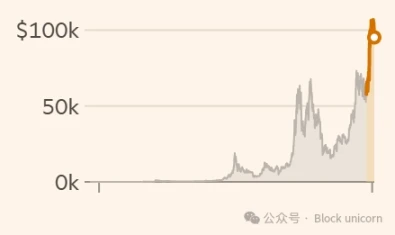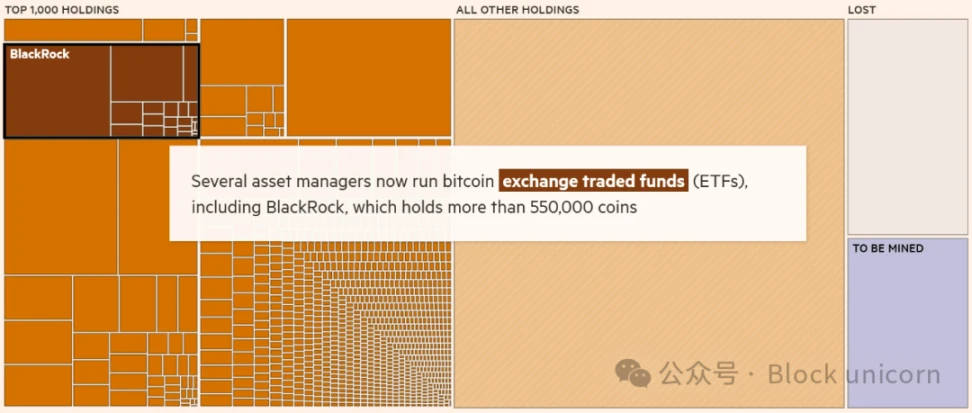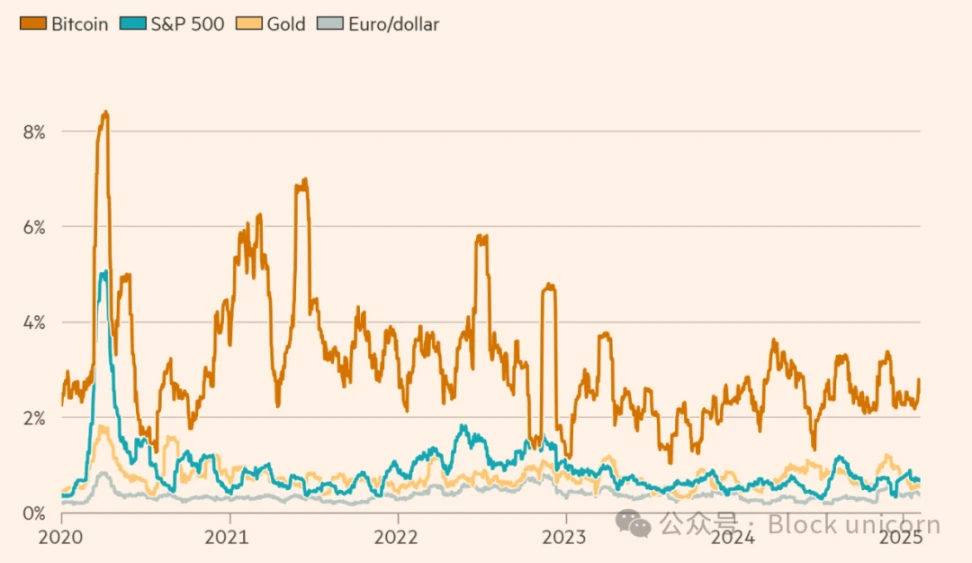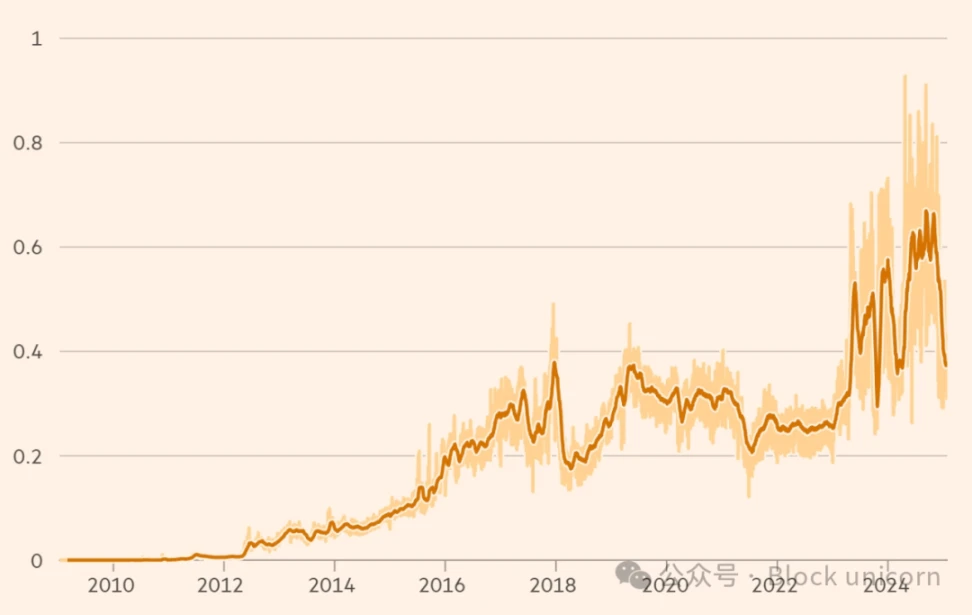Original authors: Nassos Stylianou, Nikou Asgari, Dan Clark, Sam Joiner, Irene de la Torre Arenas
Original compilation: Block unicorn
Holding Bitcoin has become cool again. U.S. President Donald Trump has vowed to make the United States the "global cryptocurrency capital," a statement that has propelled Bitcoin prices to astonishing six-figure highs.
Wall Street banks and asset management firms are preparing to make a big entrance. Investors hope Trump can transform this often-ridiculed token into a mainstream financial asset and usher in a golden age for cryptocurrencies.
The president has signed an executive order aimed at "promoting America's leadership in the digital asset space." This month, leading figures in the cryptocurrency and artificial intelligence sectors, venture capitalist David Sacks, announced upcoming legislative plans.
Enthusiasts are particularly excited about the prospect of a Bitcoin national reserve, which would solidify the U.S. government's recognition of the asset and could further drive up its price. Sacks stated, "The first thing we need to consider is the feasibility of a Bitcoin reserve."
However, how such a reserve would operate and what it would mean for Bitcoin remains unclear. If—or when—prices drop, will taxpayers be the ultimate payers? In 2022, the collapse of the well-known exchange FTX triggered a wave of bankruptcies, leading investors to sell off cryptocurrencies.
Some have begun to worry: the prominent U.S. hedge fund Elliott recently warned that Trump's embrace of cryptocurrencies could lead to an "inevitable collapse" and "potentially cause severe damage in ways we cannot yet foresee."
Bitcoin prices are currently trading near their highest point since the token's inception in 2009—but a closer examination of the 16-year history since founder Satoshi Nakamoto mined the first batch of Bitcoins reveals that price surges are often followed by sharp declines.
Here are some historical milestones for Bitcoin:
In 2009, the first transaction of Bitcoin for U.S. dollars took place on the BitcoinTalk forum, where a user exchanged 5.02 dollars for 5050 Bitcoins via PayPal.
In May 2010, Florida programmer Laszlo Hanyecz purchased two Papa John's pizzas worth 20 dollars for 10,000 Bitcoins.
Bitcoin reached 1 dollar.
Bitcoin's volatility first became apparent when the price plummeted from 30 dollars after the major exchange Mt. Gox was hacked.
Cryptocurrencies began to stabilize, with price fluctuations being more moderate in 2012.
The first "halving" event for Bitcoin occurred: a pre-programmed change in the source code halved the mining reward—aimed at controlling inflation.
Driven by global economic uncertainty and the European banking crisis, Bitcoin's price broke 100 dollars.
Amid positive statements from U.S. regulators and China becoming a major market, Bitcoin surged to 1,000 dollars—researchers later attributed this to price manipulation.
After another hacking incident, Mt. Gox suspended withdrawals and eventually collapsed, leading to a sharp drop in Bitcoin prices.
Bitcoin prices bottomed out around 200 dollars and stabilized.
The technology behind Bitcoin—blockchain—attracted interest from major banks like Barclays and Goldman Sachs.
The second halving event for Bitcoin occurred.
Bitcoin prices surpassed the price of gold per ounce.
In a speculative frenzy before the launch of the first Bitcoin "futures" contracts, Bitcoin prices soared to nearly 20,000 dollars.
A long "crypto winter": the bubble burst in 2017, leading to a significant price drop.
The third halving event occurred.
Bitcoin rebounded to 20,000 dollars and was seen as a "safe haven" amid financial uncertainty triggered by the COVID-19 pandemic.
Bitcoin reached new highs amid excitement over its listing on Coinbase's Nasdaq, the first cryptocurrency exchange to go public in the U.S.
Tesla purchased 1.5 billion dollars worth of Bitcoin.
China declared all cryptocurrency activities "illegal" and expanded its ban on trading and mining.
El Salvador became the first country to adopt Bitcoin as legal tender.
The values of cryptocurrencies TerraUSD and Luna plummeted, triggering a market crash.
The collapse of Sam Bankman-Fried's FTX exchange sparked panic and led to the downfall of many other cryptocurrency companies.
In January 2024, a spot Bitcoin exchange-traded fund was launched, causing prices to surge.
The fourth halving event occurred.
Trump was elected president. Bitcoin prices soared to 100,000 dollars. (* Laszlo's 2010 pizza order is now worth 1 billion dollars.)
Bitcoin climbed to 109,000 dollars, anticipating an executive order supporting cryptocurrencies from the U.S. government.
 Clearly, support from U.S. officials is beneficial for Bitcoin prices.
Clearly, support from U.S. officials is beneficial for Bitcoin prices.
Last year, the U.S. Securities and Exchange Commission approved the launch of regulated funds holding the cryptocurrency, paving the way for pension funds, endowments, and other large asset management firms to invest in the token. The Trump administration's strong support for the cryptocurrency industry encouraged them to do so.
Yeshayahu Yadav, vice dean of Vanderbilt University Law School, stated, "This was basically unimaginable two years ago." She added that before Trump's return to Washington, Bitcoin's price "was driven by novelty and excitement, and this time there is real institutional support."
Many believe prices can rise further. Larry Fink, billionaire founder of the world's largest asset management firm BlackRock, recently stated that if more sovereign wealth funds consider holding Bitcoin, its price could reach 700,000 dollars.
Matt Hogan, chief investment officer of cryptocurrency asset management firm Bitwise, stated, "Bitcoin has found a way to work with the government." He added that Trump's support "eliminates the last existential threat to Bitcoin."
Now, some lawmakers are pushing the government to go further. Wyoming Senator Cynthia Lummis is leading the charge to create a Bitcoin strategic reserve.
Strategic Reserve
Reserve assets are typically a key resource that can be used in times of crisis. For example, the U.S. currently has an emergency oil reserve to respond to oil supply shocks, while many countries hold gold reserves.
Lummis stated that the continuously rising value of Bitcoin could be used to reduce U.S. debt. In July of this year, she proposed a bill seeking to have the U.S. purchase 200,000 Bitcoins from the market each year for five years until the reserve reaches 1 million.
Because cryptocurrencies are largely anonymous, tracking from whom Washington purchases Bitcoin will be extremely difficult—criminals and hostile governments could profit from these purchases.
Danielle Brian, executive director of the nonprofit oversight organization "Project on Government Oversight," stated that the U.S. government's interest in cryptocurrencies raises significant "national security implications, as the types of investors involved in cryptocurrencies are problematic in themselves."
"This is a very strange idea," said Hillary Allen, a professor at American University Washington College of Law. "What we need is something that won't be eroded by inflation, we need hard currency and real reserve assets. Ironically, nothing is less 'hard' or more unreal than Bitcoin," she added.
The U.S. government currently holds nearly 200,000 Bitcoins, which were seized through criminal investigations. Previously, the U.S. government had sold some of its held Bitcoins through auctions—however, many hope the government can now resist selling these Bitcoins.
More optimistic individuals like Lummis hope the U.S. will begin actively purchasing more Bitcoins, which could drive up Bitcoin prices. "As long as they don't sell the existing reserves, any action is positive," Hogan stated.
Supporters argue that Bitcoin would be an effective reserve asset because its supply is limited. Due to the algorithm written into Bitcoin's production code, the total amount of Bitcoin will always be capped at 21 million. They believe this scarcity increases Bitcoin's value, as holding Bitcoin now means it will be worth more in the future—this also distinguishes Bitcoin from other cryptocurrencies.

- Although the nature of cryptocurrencies means ownership is anonymous, there is indeed some public information.

- Grouping the largest 1,000 Bitcoin holders by ownership type can give us a clearer understanding of the largest participants.

- Governments of countries like the U.S. and the U.K. hold 200,000 and 60,000 Bitcoins, respectively, which were seized through criminal investigations. El Salvador and Bhutan have obtained Bitcoins through mining.

- Several asset management companies, including BlackRock, now operate Bitcoin exchange-traded funds (ETFs), with BlackRock holding over 550,000 Bitcoins.

- Centralized cryptocurrency exchanges hold tokens on behalf of their clients, with Coinbase holding over 1 million Bitcoins.

- Some companies have already purchased Bitcoin, the most notable being Michael Saylor's Strategy, which until recently was known as MicroStrategy, a company that has transformed from a software firm to a Bitcoin HODLer.

- The mysterious Bitcoin founder Satoshi Nakamoto holds approximately 1 million Bitcoins, which have never been traded—accounting for nearly 5% of the total supply, worth nearly 100 billion dollars.

- Beyond the largest 1,000 holders, there are about 8 million Bitcoins whose ownership information is unknown.

- It is believed that between 1.5 million and 2.5 million Bitcoins have been lost, with their owners unable to access them.

- Additionally, over 1 million Bitcoins have yet to be mined.
The United States is not the only country considering investing in cryptocurrencies. The Czech central bank is contemplating adding Bitcoin to its reserves, while other countries are steering clear.
European Central Bank President Christine Lagarde recently stated that she is "confident" that "Bitcoin will not enter the reserves of any central bank managed by the European Central Bank."
She added that "reserves must be liquid, safe, and reliable," and "they should not be tainted by suspicions of money laundering or other criminal activities."
Bitcoin's volatility is far higher than that of other financial assets

30-day rolling standard deviation (%) of price and index levels, source: Financial Times calculations in the UK, London Stock Exchange Group • Bitcoin and gold prices in U.S. dollars
Few still view Bitcoin as a currency. Its historically extreme volatility is a primary concern— for example, we need the price of coffee to be the same in the morning and afternoon, which requires currency to remain stable so users can trust its value.
Secondly, Bitcoin holders are often reluctant to spend their Bitcoins when they believe prices will continue to rise. The Bitcoin blockchain is also difficult to scale, as it cannot process a large number of transactions in a short time.
As a result, experiments to use it as legal tender have failed. El Salvador attempted to do so in 2021 but faced strong opposition and low acceptance.
"The initial vision was to be peer-to-peer electronic cash, not an asset that is part of a balanced portfolio," said Kristin Smith, CEO of the lobbying group Blockchain Association. "Over time, it has changed… I don't see Bitcoin as a means of payment," she added.
Instead, Bitcoin is most likely to be used as an investment.
"Historically, its price has been rising, and you can't deny that, even though there have been many instances where people said 'this is the end of Bitcoin,'" said Omid Malekan, a part-time professor at Columbia Business School.
Institutional Investment
To make Bitcoin a mainstream financial asset, large-scale participation from Wall Street banks, fund managers, pension plans, and other major institutional players is needed.
Until recently, most were hesitant to hold this token for themselves or their clients, fearing regulatory backlash.
Now, under Trump's leadership, who hopes to make the U.S. the "Bitcoin superpower" of the world, those concerns are fading. "We may see further integration of cryptocurrencies with traditional finance," Allen said.
U.S. regulators have made it easier for banks and asset management companies to custody cryptocurrencies and have begun to scale back lawsuits against digital asset companies. Meanwhile, Trump's cryptocurrency task force is exploring how best to regulate token issuance and facilitate banking services for cryptocurrency companies and traders, all of which will make the industry more aligned with traditional finance.
"If the rules come out and make it a reality… the banking industry will make a big entry into trading," said Brian Moynihan, CEO of Bank of America, recently emphasizing Wall Street's desire to profit from cryptocurrency trading.
Bitcoin trading is set to surge in 2024

The number of Bitcoin transfers, daily total and 30-day rolling average (millions), source: CCData
Investors have already purchased Bitcoin in large quantities indirectly through the regulated exchange-traded funds launched last year, which have attracted over 110 billion dollars in funding.
"Investors have shifted from thinking that holding cryptocurrency positions is a mistake to realizing that not having a view on Bitcoin is the mistake," Smith said.
Bitcoin has shifted from its original mission—establishing an alternative financial system away from government and corporate oversight. Now, Bitcoin's believers are cheering for acceptance by what may be the largest institution—the U.S. government.
But policymakers are concerned that if systemically important investors like pension plans and central banks begin to hold Bitcoin, and its price collapses, the impact on other parts of the financial industry will be widespread, with cryptocurrency companies potentially facing the need for bailouts.
The volatility of cryptocurrencies, the risk of price collapse, and the use of leverage mean that as it becomes more mainstream, it "could undermine the stability of the broader financial system" and create "systemic risks… with serious negative impacts on the real economy," the New York Federal Reserve warned.
If the value of government holdings plummets and the investment is seen as unwise, a collapse in cryptocurrencies could affect the broader U.S. and global economy. The spillover effects on the bond market are a potential risk.
"The origin story of all this is a rejection of central banks and traditional finance, and ultimately I worry that it will end up being supported by central banks and governments," Allen said.
免责声明:本文章仅代表作者个人观点,不代表本平台的立场和观点。本文章仅供信息分享,不构成对任何人的任何投资建议。用户与作者之间的任何争议,与本平台无关。如网页中刊载的文章或图片涉及侵权,请提供相关的权利证明和身份证明发送邮件到support@aicoin.com,本平台相关工作人员将会进行核查。




